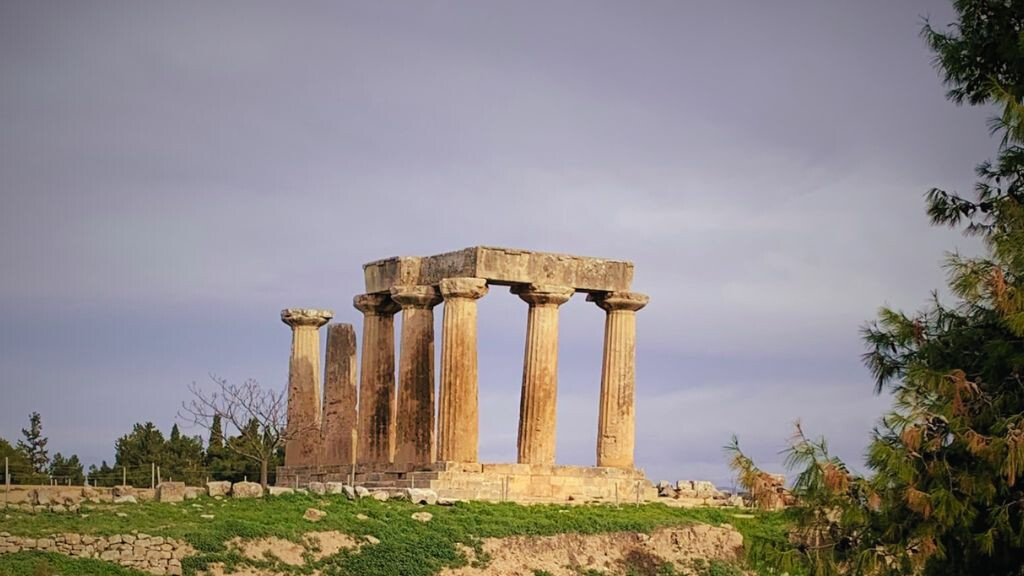Love Never Ends

Love Never Ends
I Cor 13
Today’s second lesson is a famous scripture: the love chapter, from Paul’s first letter to the Corinthians. We often hear this passage intoned at weddings, praising love’s power and virtue. We nod as Paul reminds us that Love is patient, love is kind; love is not envious or boastful or arrogant or rude. We listen in hope for the wedding couple and acknowledge the beauty and challenge of St Paul’s words: love bears all things, believes all things, hopes all things, endures all things.
But the truth is, Paul was not thinking about romantic love when he wrote this passage. He was thinking about the church he founded in Corinth. Paul had spent a year and a half as their pastor and then moved on to plant another church. But he began to hear reports that things were falling apart in Corinth. So he wrote this letter.
But who were these Corinthians, and what happened in their community? My recent travel seminar to Greece helped put this community into context. Corinth was a bustling, cosmopolitan city in the ancient world. At its peak in the Roman period, it had over 400,000 inhabitants. Its location, situated between the Agaean and Ionian Seas, meant that most anything that was shipped from Rome to the East went through Corinth.
The city was full of people from all over the known world, many of whom were wealthy, as well as slaves, merchants, and craftsmen. Corinth had a reputation for libertine behavior, the Las Vegas of the ancient world. But it was also religiously diverse and boasted Temples to Apollos and Asklepios, and a multitude of patron gods, as well as a Jewish synagogue.
Corinthian society was highly stratified. Rich and poor, men and women, slave and free. Most men belonged to professional guilds that functioned also as social clubs. Patronage was a way of life, so the wealthy always had a leg up in society.
The Corinthian Church reflected this diversity, and it caused conflict. Paul had taught the love of God expressed in Jesus and what this meant for Christian living. But once he moved on to the next city to plant a church, conflicts surfaced over who was in charge. People were confused about what was permitted in Christian behavior. People were divided on how to worship and what spiritual practices to follow. People split into camps along fault lines of class, ethnicity, and background.
Paul’s love chapter mentions a number of admirable spiritual qualities: speaking in tongues, prophetic power, deep understanding, strong faith, and sacrificial generosity. But after each one, Paul states, “if I do not have love, I am nothing.” Now you may know that there are three words for love in Greek: eros, sexual love; philos, friendship/brotherly love; and agape, self-giving love. The word Paul uses here is agape, and it is the same word used for God’s love. Paul establishes that the basis of Christian community is the same as the basis of God’s regard for us: self-giving love. And so the gentleness and mercy God showed to the Corinthians in Jesus had to work its way into how they treated each other.
As a pastor, I knew this history, but as I walked through the ruins of Corinth, I wasn't thinking about that. Instead, I was marveling at how impressive this city was – its marble streets; long colonnaded shopping areas; its road between their two ports which eliminated 130 nautical miles and days of travel.
Our group gathered at the top of a hill among the ruins for a communion service. We heard Paul’s famous words, also from this letter: Our Lord Jesus on the night in which he was betrayed took a loaf of bread… Our professors taught on the meaning of those words, how they were about the necessity for the community that carried on in Jesus’ name to live out the same inclusive love that Jesus had for his followers. And then we launched into song and prayer, and shared the bread and wine.
As we worshipped in the ruins of this amazing, powerful society I wondered, “If this thriving and advanced society could disappear, what about the rest of us?” Suddenly I understood in a new way the finitude of all things. I wondered, “What lasts?” In a world where everything is fleeting: our dreams and accomplishments, our possessions and relationshps, even our lives – they all pass away eventually. And then Paul’s words came to me: Love never ends.
Paul wrote:
Love never ends.
But as for prophecies, they will come to an end;
As for tongues, they will cease;
As for knowledge, it will come to an end.
For we know only in part, and we prophecy only in part;
But when the complete comes, the partial will come to an end…
And now faith, hope and love abide, these three;
And the greatest of these is love.
What abides, what remains is love-- agape, the self-giving love that is God. That love is what holds the universe together. It is the love that bound the fledgling Christian community in Corinth together and holds us together even when it seems that everything is coming apart. And so it is our work to put aside the things that do not last; they are of penultimate value. And we are to invest ourselves in loving like Jesus.
That’s what we are here to do at Epiphany: to live and love like Jesus. We have our annual meeting today where we will look back at the last six months and where we are headed in 2025. Our mission to grow in faith, build thriving community, and transform lives all rests on the final phrase of our mission statement: Through Christ’s love. We are bold to share our faith and dare to work for a more caring world because we understand God’s incredible, generous love for us. Through Christ’s love we are enabled to break down the ego and selfishness that keeps us apart. We are strengthened to practice the self-giving love of God in our relationships that we may foster healing in our communities, nation, and families.
Whether admiring the impressive advances or decrying the ruins of our world, let us remember what lasts: the time you spend mentoring a young person; the money you give to put someone else’s life back together; the apology you make and your effort to change your ways; the sacrificial act of courage that allows someone else to live. These all are acts of agape love – giving yourself as God gave to you in Jesus. We who have been joined to Christ can say with St Paul: love never ends.




Login To Leave Comment